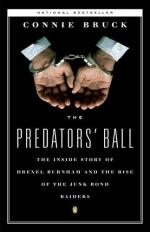
|
| Name: _________________________ | Period: ___________________ |
This quiz consists of 5 multiple choice and 5 short answer questions through Part 3: Chapter 10, 'Drexel is like a God'.
Multiple Choice Questions
1. What was the result of Tax Law reform in 1981?
(a) More and more companies were burdened with higher taxes.
(b) Big corporations faced running out of money.
(c) The increase in cash flow put companies in a better position to service debt.
(d) Only very large companies could make mergers and accquistions.
2. Why did Drexel remain a privately-held company?
(a) They did not want outsiders to get in on their business.
(b) Milken could then retain his need for secrecy.
(c) Joseph refused to allow it to happen.
(d) It was too much of a temptation for a hostile takeover.
3. Why were Milken's imitators not as successful as he was?
(a) They were bound by deeper government regulations.
(b) They had no idea how he was doing his business.
(c) They could not raise the money Milken could or with the same speed.
(d) They could not invest as much firm money.
4. What does FIFI stand for?
(a) Field Investment File Information
(b) First Investors Fund for Income
(c) Fund Income from Favored Investors
(d) Five Investment Features Initiative
5. What company was a proxy fight that Carl Ichan lost?
(a) Hammermill
(b) AB Electrolux
(c) Tappan
(d) the Times, Inc.
Short Answer Questions
1. What is it called when a firm decides to commit its own capital toward a takeover?
2. Why did Ichan and Kingsley limit themselves to 4.9% of shares in companies?
3. What was the object of gaining control of a company and sell off many of its divisions?
4. With whom was the firm of Drexel Burnham Lambert identified by the late 1970s?
5. What did Carl Ichan become known as?
|
This section contains 354 words (approx. 2 pages at 300 words per page) |

|




